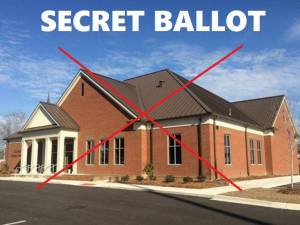
The Claxton City Council may have violated the Georgia Open Meetings Act during the first meeting of 2020.
The issue stems from a vote for the Mayor Pro Tem on Claxton’s City Council which was conducted by secret ballot.
At the direction of the mayor and in the presence of city attorney Bill Callaway, City Clerk Diane Parker distributed ballots to members of council Monday evening before collecting the ballots again and announcing that Councilman Larry Anderson defeated Councilwoman Lisa Perry 5-1. Parker announced the vote totals but not the individual votes by council members.
In February 2012, the Georgia Supreme Court ruled that “state public bodies must record in public meeting minutes the names of those members who voted against or abstained from voting on a measure, even where the vote is not taken by a roll call,” according to the Reporters Committee for Freedom of the Press. The case specifically dissected whether or not individual votes must be announced and recorded, a notion the court affirmed in favor of recording.
From the RCFP, “The Supreme Court ruled that – in light of the legislative intent of the open meetings law to increase government transparency – “it should be interpreted to require public bodies to list the names of those who vote against a proposal or abstain from voting, except where the vote is unanimous.”
To rule otherwise “would potentially deny non-attending members of the public access to information available to those who attended a meeting,” said the court. “Such a result conflicts with the Act’s goal of greater governmental transparency.”
The Attorney General at the time, Sam Olens, filed friend-of-the-court brief in support of additional transparency and praised the Ga Supreme Court ruling saying, “this ruling sets a strong precedent that government should err on the side of openness.”
Secret ballots have long been frowned upon, if not prohibited outright. The Georgia Press Association called the use of secret ballots by Screven County commissioners in 2010 a “flagrant violation of state law,” a move even the commissioner’s attorney opposed. And in 2009, Attorney Tommy Coleman, who has represented more than 30 cities and counties in Georgia, said the practice violates the open meetings law. “There’s no provision in the law that allows voting in executive session,” Coleman said. “By doing so (with the secret ballot), that is certainly tantamount to the same thing.”“There’s no provision in the law that allows voting in executive session,” Coleman said. “By doing so (with the secret ballot), that is certainly tantamount to the same thing.”
Last summer, the local newspaper filed a complaint with the Georgia Attorney General’s Office over a secret ballot taken by the Evans County Economic Development Authority. Branch, Anderson, and Callaway were all present for the secret ballot vote on the EDA and the subsequent re-vote.
The video of the meeting is below:
Claxton Council Meeting — Audit report
Posted by All On Georgia – Evans on Monday, January 6, 2020
Jessica Szilagyi is a former Statewide Contributor for AllOnGeorgia.com.


Bulloch Public Safety
11/22/2024 Booking Report for Bulloch County

Georgia Lifestyle
Bring Holiday Happiness to the Table with Easy, Festive Sides

Crime & Safety
Virginia Man Pleads Guilty to Drug Trafficking

Bulloch Public Safety
11/04/2024 Booking Report for Bulloch County

Bulloch Public Safety
10/28/2024 Booking Report for Bulloch County

Bulloch Public Safety
11/19/2024 Booking Report for Bulloch County

Bulloch Public Safety
11/07/2024 Booking Report for Bulloch County

Bulloch Public Safety
11/08/2024 Booking Report for Bulloch County





